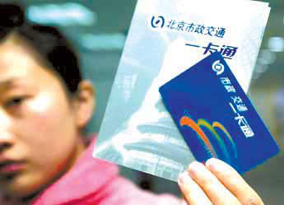|

|
dì qī shí sì kè zài běi jīng yòng yī kǎ tōng hěn fāng biàn
第七十四課 在北京用一卡通很方便
Lesson 74 Getting around Beijing with the metro card
With a metro card, people in Beijing can travel around the city easily. The Beijing transportation smart card, called yikatong, can be used on all subway lines, city-buses, some taxis and the Airport Express Train. People can get 60-percent discounts on city buses with the card. What's more, the card can be used at some designated supermarkets, long-distance bus lines and the expressways in Beijing. The public telephones along Chang'an Avenue also accepts the card. |
Text
課文
mài kè: lì li, bù hǎo yì si, nǐ néng jiè wǒ diǎnr líng qián ma? wǒ yào mǎi chē piào.
麥克:麗麗,不好意思,你能借我點兒零錢嗎?我要買車票。? 
Mike: Excuse me, Lili! Could you lend me some small change to buy bus tickets?
lì li: dāng rán kě yǐ! nǐ wàng jì dài yī kǎ tōng le ba?
麗麗:當(dāng)然可以!你忘記帶一卡通了吧?? 
Lili: Yes, of course! You forgot to bring your metro card with you, right?
mài kè: hai, bié tí le. wǒ de yī kǎ tōng huài le, gāi qù nǎr huàn a?
麥克:咳,別提了。我的一卡通壞了,該去哪兒換啊?? 
Mike: What bad luck! My metro card won't work. Where can I get it replaced?
lì li: ni děi dào fù xīng mén dì tiě zhàn qù huàn.
麗麗:你得到復(fù)興門地鐵站去換。? 
Lili: You need to go to Fuxingmen Subway Station to replace it.
mài kè: néng tuì huán kǎ de gōng běn fèi ma?
麥克:能退還卡的工本費嗎?? 
Mike: Can I get the card deposit back?
lì li: rú guǒ kǎ yǒu sǔn huài, kǎ de gōng běn fei jiù bù néng tuì huán le.
麗麗:如果卡有損壞,卡的工本費就不能退還了。? 
Lili: If the card is damaged, the deposit cannot be refunded.
mài kè: nà kǎ lǐ de yú é ne?
麥克:那卡里的余額呢?? 
Mike: What about the balance on my current card?
lì li: kǎ lǐ de yú é huì zhuǎn dào xīn kǎ lǐ.
麗麗:卡里的余額會轉(zhuǎn)到新卡里。? 
Lili: The balance of your current card will be transferred to your new card.
mài kè: yuán lái rú cǐ. wàn yī wǒ bǎ kǎ diū le zěn me bàn?
麥克:原來如此。萬一我把卡丟了怎么辦?? 
Mike: I see. What if I lose my metro card?
lì li: kǎ shì bú jì míng de. nǐ děi chóng xīn bàn yī zhāng.
麗麗:卡是不記名的。你得再重新辦一張。? 
Lili: The metro card is unregistered so you have to apply for a new one.
mài kè: kàn yàng zi wǒ zhǐ hǎo pǎo yī tàng le. cóng zán men gōng sī qù fù xīng mén zěn me zǒu?
麥克:看樣子我只好跑一趟了。從咱們公司去復(fù)興門怎么走?? 
Mike: It looks I have to make a trip to Fuxingmen. How can I get there from our company?
lì li: zuò dì tiě qù zuì fāng biàn, zhōng tú bú yong dǎo chē le.
麗麗:坐地鐵去最方便,中途不用倒車了。? 
Lili: The most convenient way is to take subway. You won't have to change buses on the way.
mài kè: hǎo, nà wǒ jiù tīng nǐ de, zuò dì tiě qù. lái huí shí kuài qián gòu le ba?
麥克:好,那我就聽你的,坐地鐵去。來回十塊錢夠了吧?? 
Mike: OK, I will take subway as you suggested. Is 10 yuan enough to get there and back?
lì li: rú guǒ nǐ bú zài qù qí tā dì fāng, nà jiù zú gòu le.
麗麗:如果你不再去其它地方,那就足夠了。? 
Lili: Yes, it is if you don't want to go to any other place.
New Words
生詞
一卡通 yī kǎ tōng: Beijing's metro card? 
方便 fāng biàn: convenient? 
不好意思 bù hǎo yì si: Excuse me, could you (may I)…? 
借 jiè: lend? 
零錢 líng qián: small changes? 
車票 chē piào: bus ticket? 
損壞 sǔn huài: damage,? 
更換 gēng huàn: replace? 
地鐵 dì tiě: subway; underground railway? 
退還 tuì huán: refund? 
余額 yú é: balance; remaining fund? 
原來如此 yuán lái rú cǐ: I see; so, that's how it is? 
萬一 wàn yī: what if? 
丟失 diū shī: lose? 
不記名的 bú jì míng: unregistered? 
申請 shēn qǐng: apply for? 
中途 zhōng tú: on the way? 
倒車 dǎo chē: change buses? 
來回 lái huí: go to a place and come back? 
足夠 zú gòu: enough? 
View all the lessons >>
(China.org.cn by Li Jingrong)